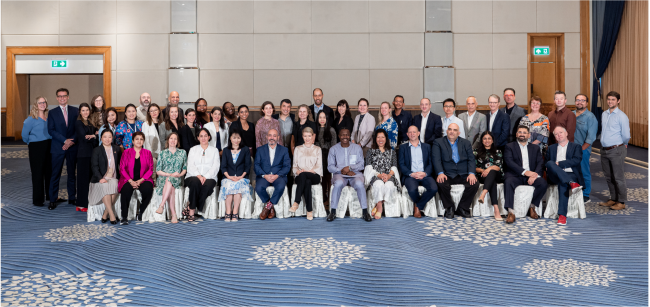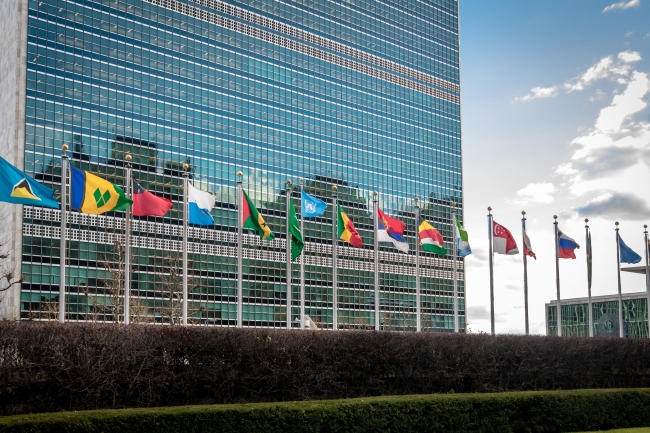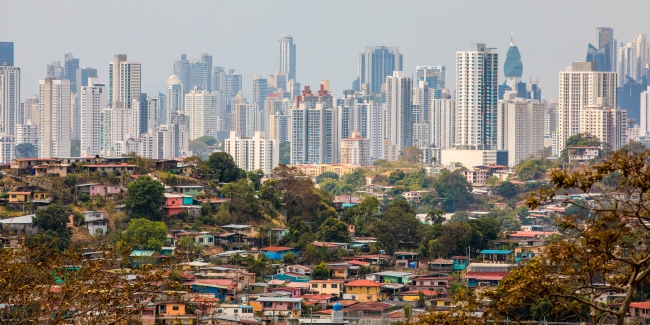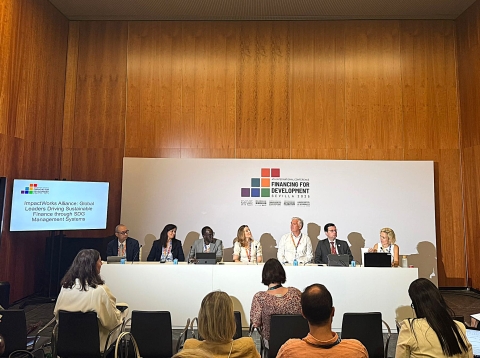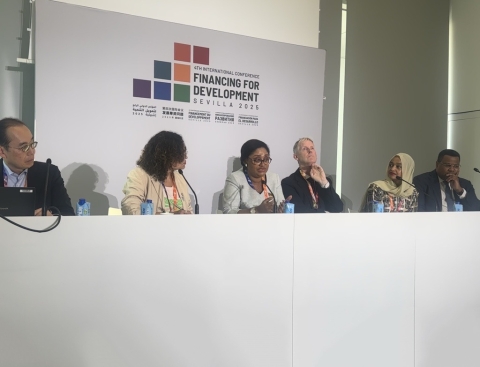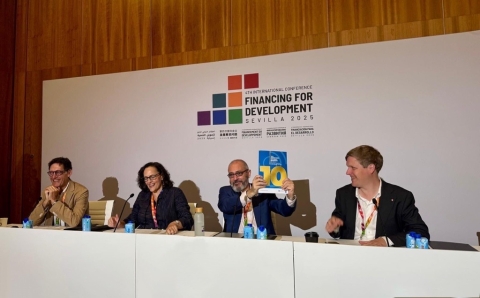UNDP Sustainable Finance Hub director addresses Sri Lanka Parliament
18 AUGUST, 2022
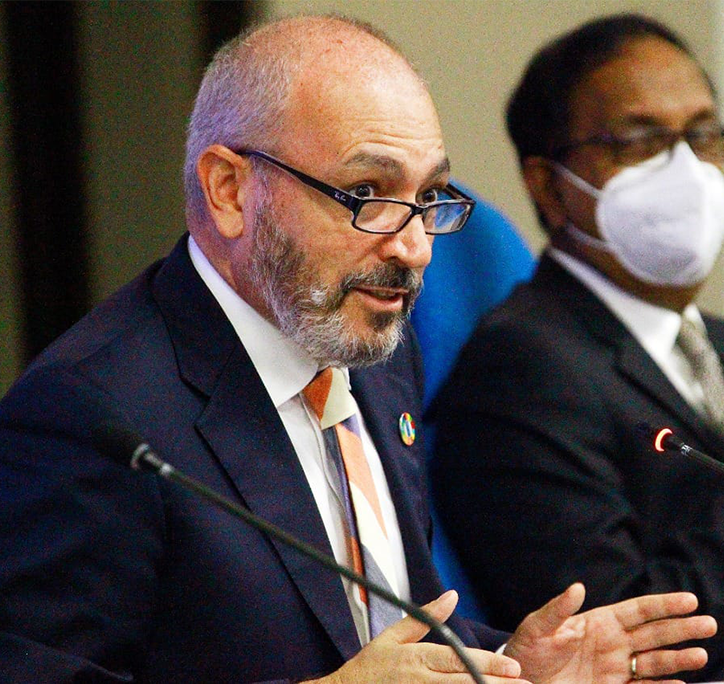
Speech
Speech by Marcos Neto, Director, Sustainable Finance Hub, UNDP
August 8, 2022
Address
Excellencies,
Distinguished Members of Parliamentary Committee on Public Finance,
Thank you for the opportunity to discuss the global issues related to public finance and development with you and specifically how to support Sri Lanka overcome its current economic and fiscal challenges.
Introduction
Excellencies and distinguished members, we are at a critical juncture as the world faces multiple crises around healthcare, securing wellbeing, preventing climate emergencies, and containing economic crises and conflict. 60 percent of the poorest nations are either in debt distress, or at high risk of default. Globally, over the past few months, 71 million people have stepped into poverty, further aggravating social crises. This is further compounded by the gap of USD1.2 trillion annually needed for social protection in developing countries.
Solutions are therefore needed to address these challenges. Excellencies and distinguished members, the transformative power of effective, efficient, and fair taxation, linked to prudent spending of public funds on social services, offers one such solution. This will require equipping developing countries with the expertise and the technology required to strengthen their tax systems and tackle the problem of illicit financial flows which undermines states’ domestic resource mobilization capacity and public trust. Since these challenges are interrelated, multilateral and multistakeholder solutions are necessary towards resolving these challenges.
Excellencies and distinguished members, UNDP is the United Nations leading development agency, with a global, regional and country level presence. UNDP in working closely with government, civil society, private sector and communities, is committed to a principle-led, evidence-based approach to development cooperation promoting country ownership, inclusive partnerships, focusing on results, mutual accountability and transparency. In the context of the post-pandemic recovery, UNDP is committed to a people centered, inclusive recovery putting people and the planet first towards achieving shared prosperity. This is the vision that underpins my talk today which now turns to addressing the Sri Lankan crisis and to offer some proposals.
UNDP has been working with Sri Lanka since 1967. We have seen Sri Lanka bounce back from adversity in the past. I am, therefore, optimistic of Sri Lanka’s resilience and offer our support. We understand that recovery, with many interlinked challenges at hand, needs to be a joint effort, where different partners and stakeholders work together in an integrated and coordinated manner.
Let me make 6 proposals for your consideration
1. First is on Combatting tax evasion and reforming tax systems
Taxation stands at the core of financing public development and is integral to achieving the SDGs. Tax policy can incentivize desired behaviors and help attract additional investment and address intersecting inequalities. Taxes are vital in fostering a stronger social contract between citizens and the state, since tax represents the state’s commitment to provide public goods and services commensurate with the shared tax burden of its citizens. Regrettably, in many countries tax and fiscal policies are not being leveraged to their fullest potential, tax systems are perceived as inequitable and unfair, and tax revenues are not clearly linked to development outcomes. National tax rules are also being undermined by cross-border tax and fiscal arrangements. Weaknesses and loopholes in tax policy and tax administration have led to ineffective tax incentives, facilitated tax avoidance, tax evasion and illicit financial flows, which in turn have caused countries to lose significant tax revenues that they could have used for sustainable financing of state expenditures.
From the 1950s to the 1980s, various Sri Lankan governments have collected a high proportion of Gross Domestic Product (GDP) in taxes. Between 1950 and 1989, the Sri Lankan government’s tax to GDP ratio averaged 21 percent. The government spent most of that money on the provision of health and education services, and on food subsidies. Sri Lanka was a model welfare state, with high human development indicators. Today, tax revenues contribute to less than 10% of the GDP. The decline in tax revenue has resulted in significant reductions in social spending which mainly benefits poorer people. Due to this, and the resulting failure of the revenue system to further optimize the taxation of new streams of income and wealth creation, the fiscal system has advertently moved against the poor, placing the tax burden on them. These tax-based revenue concerns have been left unaddressed in policy discourse. As Sri Lanka prepares to enter a macro-fiscal programme under the guidance of the IMF this year, tax reform must be prioritized. The IMF Article IV consultation report expresses the agreement between itself and Sri Lankan authorities on fiscal consolidation, that it should primarily be revenue based. To support the revival of the Sri Lankan economy the solution lies in strengthening the nation’s DRM capacity by focusing on two aspects:
Excellencies and distinguished members- Sri Lanka should first consider widening its income tax and VAT base. This can be achieved by the removal of tax incentives for the time being and considering the imposition of a wealth tax. Second, the government must address large tax compliance gap by strengthening its revenue administration.
The question of raising domestic sources of revenue is critical now more than ever, especially because Sri Lanka is heading towards revenue-based fiscal consolidation. Based on our work at UNDP, I offer a proposal to augment DRM. As part of this, Sri Lanka should focus on efforts towards containing tax base erosion and profit shifting, which are costing developing countries up to $600bn annually. This is more than three times the total ODA given to developing nations.
A lot of tax is lost due to transfer mispricing and aggressive tax planning schemes. Strong safeguards are needed to prevent these base erosion activities. Here Tax Inspectors Without Borders Initiative can support Sri Lanka.
TIWB is a partnership between the UNDP and OECD helping national tax administrations with hands-on technical assistance to mobilise additional taxes. TIWB programmes have led to the mobilization of more than $1.6bn in additional tax revenues globally, by increasing national capacities. The net effect is that for every dollar invested in a TIWB programme, there is a return of 127 dollars.
TIWB can support Sri Lanka’s revenue officers with the training and technical capacity development needs to detect and curb revenue erosion schemes. Working with TIWB is not new to Sri Lanka. The Inland Revenue Department (IRD) received its first TIWB Programme Assistance between 2015 to 2018 targeted towards addressing transfer pricing. There have been recent discussions between TIWB and Sri Lanka’s Ministry of Finance on launching a new full TIWB programme focusing on conducting tax audits in the construction and tourism sector.
Similar programmes have been supported by TIWB in the Asia Pacific region. TIWB is currently providing support to Bhutan, Cambodia, Malaysia, Maldives, Mongolia, Pakistan, Papua New Guinea and Thailand. Mongolia earned an additional USD 228 million in revenue from its first transfer pricing assessment which was conducted with TIWB support. Maldives specifically appreciates that TIWB experts support local experts on real audit cases through an extended period of time, guiding towards progress. Should Sri Lanka be willing to start a full TIWB programme in the short- or mid-term, TIWB stands ready to offer its support.
2. My second proposal is for Sri Lanka to move towards progressive taxation systems
While progress towards achieving the SDGs in most countries has been stalled due to pandemic, progressive taxation remains critical in financing the bare minimum of human needs. Excellencies and distinguished members, to support a sustainable progressive tax system for the realization of SDGs, we launched the Tax for SDGs Initiative this year. It focuses on practical actions for capacity building, institutional and societal change in tax systems to support the financing and achievement of the SDGs. Tax for SDGs supports countries to identify, understand and leverage the role of taxation towards recovery from the COVID-19 crisis and building back better.
Excellencies and distinguished members, Progressive Taxation facilitates building a cohesive and inclusive society by raising revenue incrementally to redistribute resources equitably in society. In a progressive tax system, those with higher incomes pay higher taxes. Redistributive tax policy tools, such as personal income tax, taxes on wealth, property and assets, excise taxes on luxury goods, when well utilized have the potential to reduce inequality gaps promoting more inclusive societies. With Sri Lanka’s indirect taxation accounting for an estimated 80 percent of revenue and significant tax incentives and concessions, there is huge potential to increase tax collection and make the tax system more equitable by introducing more progressive considerations.
Excellencies and distinguished guests, increased focus on progressive taxation has resulted in Pakistan recently embarking on putting more emphasis on direct taxation in its Federal Budget by adding measures to increase income tax & capital value tax, taxing unproductive assets and proposing luxury tax. India’s and Thailand’s tax system also include elements of progressivity by tiering income tax categories. Indonesia has taxes on luxury goods and high-value vehicles. Uganda, through establishing a high-net-worth individual unit within its tax administration, has managed to raise more revenue and increase the proportion of wealthy individuals who file their income tax returns. These are examples that Sri Lanka can consider to emulate as best practices.
UNDP is already supporting the Economic Policy Analysis Unit situated in the Ministry of Finance, which provides us a unique opportunity to work with the bureaucracy to help them implement progressive policies and make their systems and processes more efficient. We can work further with them to conduct an analytical study on the distributional impact of different tax provisions.
3. This brings me to my proposal on Tax Expenditures
Excellencies and distinguished members, the Sri Lankan tax system is characterized by many exemptions and incentives. The Central Bank of Sri Lanka in its 2022 annual report pointed out that the country’s revenue to GDP ratio has reached its lowest level since 1959 and is on a downward spiral from 12.7% in 2019 reducing to 8.7% in 2021. This decrease is attributed to the reduction of the standard corporate income tax from 28% to 24%, alongside the reduction of personal income tax rate from 24 to 18 percent. At the same time, many new sectoral exemptions were also introduced. Further, in response to containing covid-19 during its peak phase, the government prohibited the sale of liquor thereby losing around USD 28 million or Lankan Rs. 10 billion.
Sri Lankan government needs to carry out tax reform to override the fiscal constraints brought about from these decreasing revenue thresholds. Emphasis should be placed on tax expenditure reform. Identifying which tax expenditures are cost-effective and which ones are not value for money or trigger side effects is a crucial first step to reform the tax expenditure system in the country. This would not only increase tax revenue collection, but also contribute to better aligning the tax expenditure system with the SDG agenda.
In 2019, the revenue forgone through tax expenditures reported by the Sri Lankan government accounted for 1.5% of GDP and almost 13% of tax revenue. Against this backdrop, UNDP’s Tax for SDGs initiative can support Sri Lanka to bring an SDGs lens to the tax expenditure system and set up a robust mechanism to analyze the potential effects of different tax expenditure proposals.
4. The fourth proposal is at the intersection of Energy and Taxation
Excellencies and distinguished members, meeting energy needs to power export-oriented industries and services is a critical part of a lasting solution to current challenges in Sri Lanka. The ability to use renewables for the lion’s share of a grid’s supply, coupled with the fact that grid-level renewable generating capacity is now price competitive with the cost of fossil fuel-based generation, is an opportunity for the future. Sri Lanka can consider how it can increase the share of renewable energy share in total energy consumption. The government should formulate taxation policies to support this goal, help the nation reduce foreign exchange expenditure on imports of fossil fuel and pursue a decarbonization strategy. Good tax policy can help make the power on electric grids emissions-free, cheap and copious. Tax measures can start with creating an enabling environment for both small and utility grade generation from renewables. It can then move towards interventions that encourage better demand management and consumption as part of a long-term strategy of electrifying all processes that now require fossil fuels.
UNDP’s Tax for SDGs initiative can support Sri Lanka with a package of policies possibly in off-grid renewable generation and energy efficiency and with technical assistance and implementation support.
5. My fifth proposal relates to Digitalization of Tax Administrations
Tax authorities are only as good as the data they have on taxpayers. Digital transformation of tax authorities can help governments quickly boost revenues without necessarily overhauling existing rules and regulations. The pandemic and the ensuing economic crisis have created a unique and time-sensitive opportunity for governments to digitize tax administration. Research shows that the Revenue Administration Management Information System (RAMIS) of Sri Lanka’s Inland Revenue Department (IRD) has struggled due to poor infrastructure as well as the current legal framework that hinders the full-fledged functioning of the system. Bringing together its wealth of experiences and networks, the UNDP can support the government of Sri Lanka during its fiscal crisis.
TIWB has recently started the modality on Digitalization on Tax Administrations and has started a programme in Malaysia. We have an opportunity to work together with another country like India to share its experiences on digitalization of tax administrations and help digitalize Sri Lanka’s Tax Administration. Enhanced tax administration can help increase revenue collection, in the short term directly through audit and enforcement actions and longer-term improvements in compliance by taxpayers.
6. Excellencies and distinguished members, my final proposal focuses on Gender and Taxation
Sri Lanka has made considerable progress and gains for gender equality, but gender issues remain, particularly in labor force participation, unpaid care and in gender responsive public service provision such as gender-based violence programs, all which are impacted by the taxation system. The gendered effects of taxation relate mainly to explicit and implicit biases embedded in tax policies. For example, feminine hygiene products such as sanitary napkins are currently taxed at 52%. Indirect taxation via VAT which is considered a regressive tax also negatively impacts low-income earners who are mostly women living in poverty and other marginalized groups despite VAT contributing to the national tax revenues significantly. The governments can therefore institute reforms and use tax and fiscal policies to enhance the status of women in the economic sphere by incentivizing labor force participation, asset ownership and the growth of women-owned businesses and by carrying out gender impact analyses of tax policies. Sri Lanka has the potential to grow its economy by as much as 20% by closing its gender gap in the workforce. Increasing women’s labor force participation can improve productivity by not only adding more people to the workforce, but also by enhancing diversity of thought in the workplace.
UNDP’s Tax for SDGs initiative can support Sri Lanka in this regard with technical assistance and implementation support.
Excellencies and distinguished members those were my 6 proposals for Sri Lanka to consider in emerging resilient from its current crisis pegged on scarcity of revenue.
As I move to the concluding part, I’d like to point towards Sri Lanka’s need for Broader Public Finance Management and UNDP’s offer to support Sri Lanka’s Committee on Public Finance to assist the implementation of measures I have discussed.
Whilst Sri Lanka’s core fiscal issues revolves around revenue generation and much of the foregone discussion relates to that, we understand that public finance management challenges are much broader. Government has a clear need to rationalize tax incentives together with the need to ramp up expenditures on social protection, health and education. Going forward, the government will also need to look at lowering its financing charges–which is currently, the single largest item of government expenditure and manifest of country’s significant debt burden –amounting to over 119% of GDP. Prior to the onset of the COVID crisis and recent economic turmoil, the country had ready access to international capital markets. For sustained recovery and development, it is imperative that Sri Lanka regains its market access. Strong policies for fiscal and monetary stability along with structural policies for long term growth will be important here. Equally important would be that policies and measures implemented through the governance and institutional mechanisms in the country and these provided with sufficient autonomy and independence to carry out duties. UNDP stands ready to provide any capacity development that may be needed.
We understand that the current IMF program proposed for Sri Lanka is pursued on two fronts: firstly, a broad framework for recovery underpinned by fiscal, monetary and structural policies that would form the basis of a staff level agreement; and secondly negotiations with creditors supported by recently appointed transactions advisors and legal advisors on debt restructuring. UNDP reiterates its support on both fronts. Finally, on debt restructuring, Sri Lanka could draw inspiration from countries like Belize that undertook a major restructuring of its external non-concessional debt through a debt swap operation. We look forward to undertaking this important work with you.
Working with the Committee on Public Finance
And in terms of focusing attention on domestic resource mobilization and its linkage with public goods such as healthcare and education, there is a critical role of political representatives. They have a leading role to play in setting the agenda and initiating the legislation process, in appropriation and in providing critical scrutiny. It is important that tax collection goes hand in hand with better public services and infrastructure. Voters are willing to pay taxes, as long as they saw the results and value they gained for their money.
However, in the policy making arena there is a lack of shared understanding and knowledge on public finances and its implication for underpinning economic resilience and long-term wellbeing. Therefore, we are happy to work together with the Committee on Public Finance, and the government, leveraging your uniquely important roles and power, to develop a shared understanding on taxation and SDG issues. We look forward to undertaking this important work with you.
Let me finish on a personal note, I came to the shores of this beautiful island for the first time in 1997, when a different crisis faced this country. I fell in love with the hills, the culture and beaches of this country. So much so that many years late I married a Sri Lankan and have two Brazilian-Sri Lankan kids and have been coming back here for the last two decades. I have seen this country's resilience in the face of a previous crisis and the generosity of its people. I am sure that a new unity among all elements of society can be found and then there is nothing that Sri Lanka cannot accomplish.
Thank you very much.

